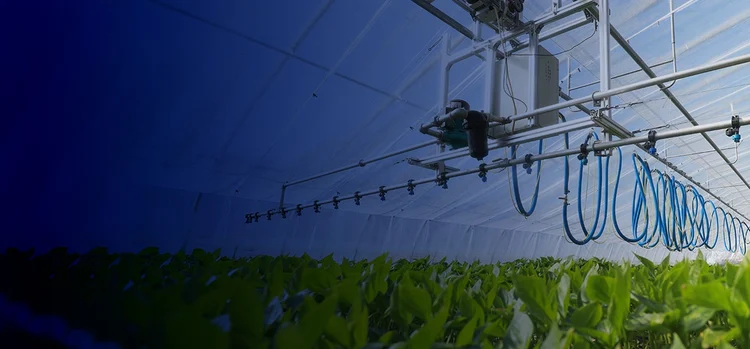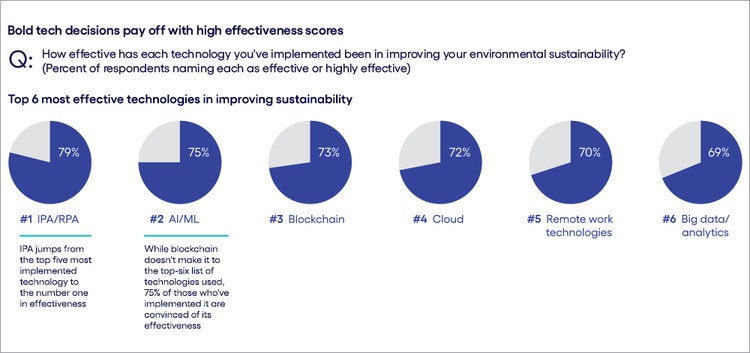
Study: Intelligent automation is #1 for boosting sustainability styles-h2
<p><br> August 07, 2023</p>
Study: Intelligent automation is #1 for boosting sustainability
<p><b>In our recent study, the majority of executives who’ve implemented intelligent automation to support their environmental sustainability initiatives found it to outperform other technologies used for this purpose.</b></p>
<p>The world is about to see a fast acceleration in business sustainability initiatives and investments. In our recent study of 3,000 senior executives, we found spending levels will markedly increase between now and 2025, with a near-doubling in the number of respondents boosting sustainability spending by 10% or greater in that timeframe.</p> <p>The question for business operations leaders is where to focus their sustainability efforts. It has long made sense that because process optimization and automation can greatly enhance efficiency, it will also reduce the environmental footprint of both internal operations and processes that extend into the value chain.</p> <p>For instance, by incorporating basic automated building controls into the energy distribution system of smart buildings, businesses can realize <a href="https://www.weforum.org/agenda/2021/09/how-to-build-zero-carbon-buildings/" target="_blank">10% to 15% energy savings</a>. More advanced functionality, such as demand-controlled ventilation, can yield an additional 5% to 10% energy savings.</p> <p>Another intuitive example is in the supply chain, where process optimization and automation can help identify and eliminate inefficiencies, reduce production and transportation-related emissions, and support circular economy goals.</p> <p>However, the challenges inherent to implementing automation technologies have often served as a deterrent. Automating and optimizing processes takes cross-enterprise collaboration and alignment among multiple functions, often using different tools and diverse systems. In our study, only 42% of respondents ranked robotic process automation and intelligent process automation (RPA/IPA)—which includes automation and AI technologies—among the top six technologies deployed to improve environmental sustainability (see Figure 1).</p>

#
<p><span class="small">Figure 1<br> Source: Cognizant Research<br> Base: 3,000 senior executives</span></p> <p>When looking at impact, however, RPA/IPA tools and technologies are a clear winner when it comes to boosting sustainability. In our study, 79% of respondents who had deployed process automation rated it as effective or highly effective in advancing their sustainability strategy, making it the most effective among the technology areas explored (see Figure 2).</p>

#
<p><span class="small">Figure 2<br> Source: Cognizant Research<br> Base: 3,000 senior executives</span></p> <p>Generative AI will only increase the impact of intelligent automation, as it brings new levels of creativity, problem-solving and adaptability to the automation space and, more broadly, to operations. As businesses shift to AI-first operating models, they will be able to accelerate their sustainability efforts through innovation and more dynamic resource optimization along the value chain.</p> <p>Such advancements will be seen in areas like material discovery and product design—which can be optimized for minimal environmental impact, durability and reuse or recycling—as well as predictive maintenance and proactive supply chain optimization.</p> <p><i>For more on how businesses are currently advancing toward their sustainability goals, as well as what will drive future impact, see </i><a href="https://www.cognizant.com/us/en/insights/perspectives/sustainability-in-business-beyond-green-to-deeply-green-wf1518050" target="_blank" rel="noopener noreferrer"><i>our report</i></a><i> “Deep Green: How data, technology and collaboration will drive the new phase of sustainability in business.”</i></p> <p><i>Visit our <a href="https://www.cognizant.com/us/en/services/intelligent-process-automation" target="_blank" rel="noopener noreferrer">Intelligent Automation page</a> to explore more on how automation can help your business.</i></p>
<p>We’re here to offer you practical and unique solutions to today’s most pressing technology challenges. Across industries and markets, get inspired today for success tomorrow.</p>
